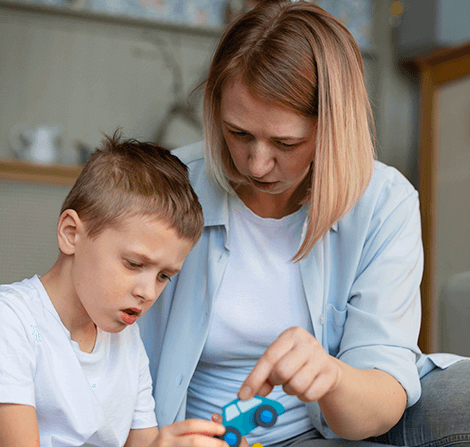Key Features of Autism Spectrum Disorder (ASD)
Autism Spectrum Disorder (ASD) encompasses a range of developmental differences. Below are its key features:
Social Interaction Challenges:
Difficulty in understanding social cues, forming relationships, or engaging in back-and-forth conversations.
Communication Difficulties:
Delayed speech development, nonverbal communication, or repetitive language use.
Repetitive Behaviors:
Engaging in repetitive actions, rituals, or having intense interests in specific topics or objects.
Sensory Sensitivities:
Overreaction or underreaction to sensory inputs, such as sounds, lights, textures, or smells.
Detailed Overview in Points
1. Common Signs and Symptoms:
Social Skills:
- Avoidance of eye contact.
- Difficulty understanding others' emotions.
- Challenges in making friends or playing cooperatively.
Communication:
- Limited or delayed speech development.
- Difficulty using gestures or facial expressions.
- Echolalia (repeating words or phrases).
Behavior Patterns:
- Repetitive movements (e.g., hand-flapping, rocking).
- Strict adherence to routines or resistance to change.
- Strong interest in specific topics (e.g., trains, numbers).
Sensory Processing:
- Discomfort with loud noises or bright lights.
- Preference for specific textures in food or clothing.
2. Causes and Risk Factors:
Genetic Factors:
- Family history of ASD increases likelihood.
- Mutations in certain genes linked to the condition.
Environmental Influences:
- Prenatal exposure to certain substances or complications.
- Advanced parental age at the time of conception.
3. Diagnosis:
- Developmental Screening: Pediatricians assess early milestones and behaviors.
- Comprehensive Evaluation: Involves psychologists, neurologists, and speech therapists using structured assessments and observations.
4. Treatment and Support:
- Behavioral Therapies: Applied Behavior Analysis (ABA), occupational therapy, and social skills training.
- Educational Support: Individualized Education Programs (IEPs) tailored to learning needs.
- Speech Therapy: Enhances communication abilities for both verbal and nonverbal individuals.
- Medication: Used to manage specific symptoms like anxiety, hyperactivity, or sleep issues.
- Parent Training: Provides strategies for managing behaviors and fostering development at home.
